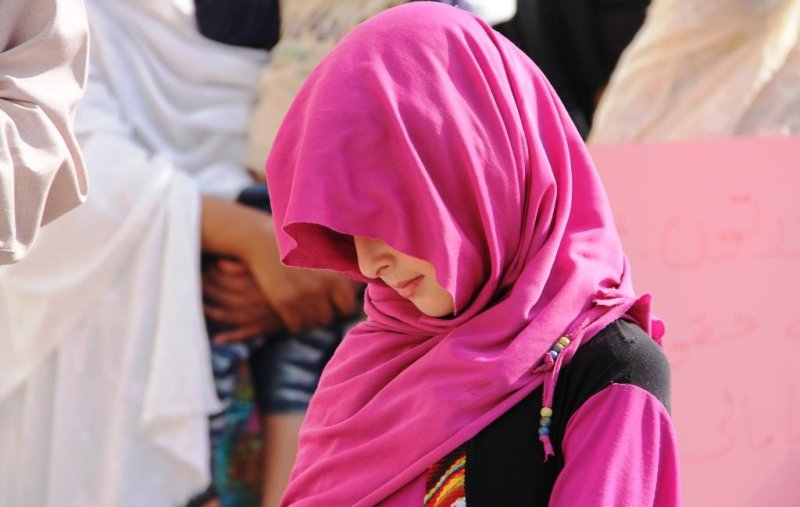1 of 2 | Sanila, 8, a girl given in swara in the Madyan area of Pakistan's Swat valley. UPI Next/Fazal Khaliq
MINGORA, Pakistan, Dec. 19 (UPI Next) --
Pakistani laws banning a centuries-old custom of giving girls away to settle a feud are still being ignored, leaving rural girls vulnerable to being handed over for life to their families' rivals, activists and legal experts say.
"It is extremely difficult to give an exact number as these cases are hardly reported," research anthropologist Simar Minallah, who has been lobbying for eradication of the practice, told UPI Next.
"However, in 2011 and 2012, around 200 cases were reported from different parts of Pakistan."
The custom -- known as "swara" in northwestern Pakistan, and as "vani," "sang chatty" and "ijaai" in other parts of the country -- effectively consigns the girls to lives of suffering at the hands of the family to which they are handed, Minallah said
The practice was first outlawed in 2005 in the Pakistan Penal Code. Two years ago, a new separate law to criminalize the practice went into force, the Prevention of Anti-Women Practices Act, which bars the giving away of a girl or woman to settle a dispute. Those found guilty face jail sentences of three to 10 years and a $4,600 fine. Under the 2005 law, the crime carried the same jail sentence but no fine.
The tradition dates back 400 years. Many elders and influential residents of Swat, in Pakistan's conservative northwest, support it.
Minallah, who has been involved in campaigns to eliminate the custom since 2003, said the girls who are given away end up bearing the punishment for their male relatives' actions.
"This tradition shows the patriarchal mindset of our society, where girls are used as commodities or tools to resolve disputes. Instead of paying blood money, people prefer to give away their girls in compensation," she said.
"It is the little girl who is punished for the rest of her life, disregarding both culture and religion."
One of the thousands of women whose lives have been ruined by the practice is Bihar Bibi, now 54.
As a girl, she was given away by her parents to a man 20 years her senior, in her home district of Upper Swat in the northern hills of Khyber Pakhtunkhwa province.
She described her life as hell from the day she was given away.
"I suffered every moment of my life in torment, as I was not treated as a human being by my in-laws, nor by my husband," she said.
"There was not a single day in which I did not encounter verbal and physical violence from them.”
Early swara practices were completely different than today's, Minallah said.
"The way it is being practiced today is not how it was practiced in the past. It used to be mostly symbolic. A girl would be sent to the enemy's family and would be returned the same day with a veil," she said.
She called for strict enforcement of anti-swara laws.
Tabbasum Bashir, an influential woman who made history by heading the first females-only tribal council, or "jirga," in Swat, vowed to lead street protests if the practice is not extinguished.
"The government should tell us clearly when the bleak tradition of swara will end in our area," Bashir told UPI Next.
"If no serious action is taken by authorities to eliminate the custom, we will come out on the streets and stage severe protests against the government.
"We want proper implementation of the law. We want law enforcement agencies to keep a vigilant eye on rural areas in order to stop the practice completely.”
A senior Swat District official said the district government had directed all law enforcement agencies to be more vigilant.
"Whenever we come across any such case, we take prompt legal action against the violators and show no laxity," Swat Assistant Commissioner Farrukh Ateeq told UPI Next.
Since July, police have made arrests in seven swara cases across Swat, the Swat District police office said. The girls who had been pledged in marriage to family rivals, sometimes enemies, were ages 5, 6, 7, 8 and 10. Three had been betrothed to boys ages 8 to 15, police records showed.
Nadia Sher Khan, a member of the Khyber Pakhtunkhwa provincial Parliament, and a member of the ruling Tehreek-e-Insaf party, said implementation of the laws banning swara had been poor.
"Though we have a Women's Protection bill, which is enough for the protection of women, there is no effective implementation of the law," Khan told UPI Next.
The provincial government is setting up women's committees in every district of Khyber Pakhtunkhwa province, she said.
"The women's committees will, in particular, monitor any practice of swara," she said.
"I appeal to the common public to inform law enforcement agencies as soon as a swara case occurs in their area.”
Since 2011, 102 people have been arrested in swara cases, and 12 girls saved from swara marriage pacts, Swat District police office data indicates.
Minallah cited the need for changed attitudes if this tradition is to end.
"When religious leaders start condemning it in their Friday sermons, when local journalists play the role of the eyes and ears of the community, and when silence around such issues is challenged, only then will change come," she said.





